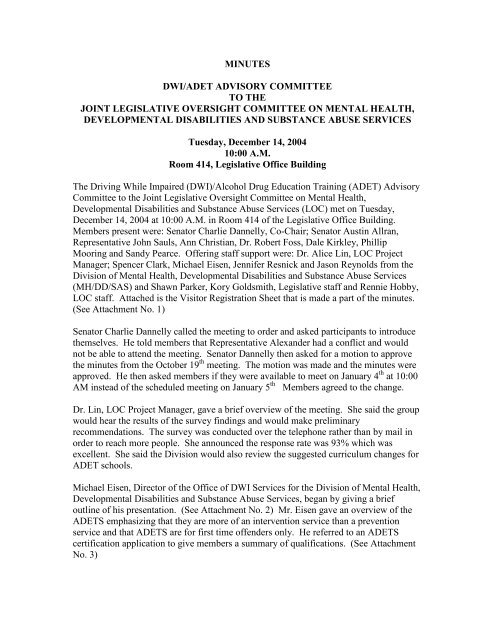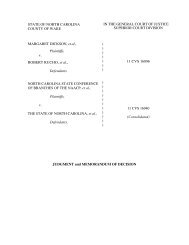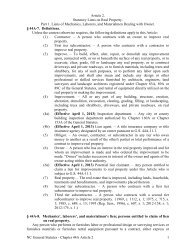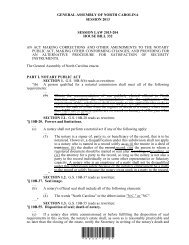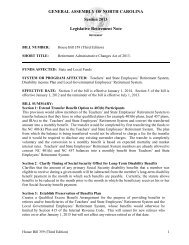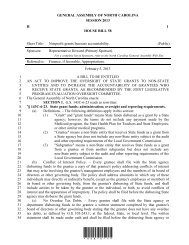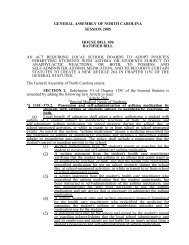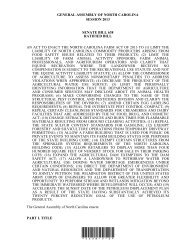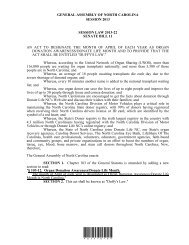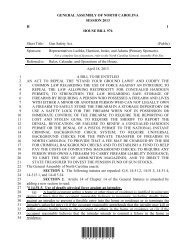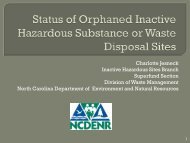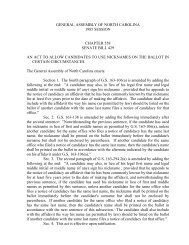MINUTES DWI/ADET ADVISORY COMMITTEE TO THE JOINT ...
MINUTES DWI/ADET ADVISORY COMMITTEE TO THE JOINT ...
MINUTES DWI/ADET ADVISORY COMMITTEE TO THE JOINT ...
Create successful ePaper yourself
Turn your PDF publications into a flip-book with our unique Google optimized e-Paper software.
<strong>MINUTES</strong><br />
<strong>DWI</strong>/<strong>ADET</strong> <strong>ADVISORY</strong> <strong>COMMITTEE</strong><br />
<strong>TO</strong> <strong>THE</strong><br />
<strong>JOINT</strong> LEGISLATIVE OVERSIGHT <strong>COMMITTEE</strong> ON MENTAL HEALTH,<br />
DEVELOPMENTAL DISABILITIES AND SUBSTANCE ABUSE SERVICES<br />
Tuesday, December 14, 2004<br />
10:00 A.M.<br />
Room 414, Legislative Office Building<br />
The Driving While Impaired (<strong>DWI</strong>)/Alcohol Drug Education Training (<strong>ADET</strong>) Advisory<br />
Committee to the Joint Legislative Oversight Committee on Mental Health,<br />
Developmental Disabilities and Substance Abuse Services (LOC) met on Tuesday,<br />
December 14, 2004 at 10:00 A.M. in Room 414 of the Legislative Office Building.<br />
Members present were: Senator Charlie Dannelly, Co-Chair; Senator Austin Allran,<br />
Representative John Sauls, Ann Christian, Dr. Robert Foss, Dale Kirkley, Phillip<br />
Mooring and Sandy Pearce. Offering staff support were: Dr. Alice Lin, LOC Project<br />
Manager; Spencer Clark, Michael Eisen, Jennifer Resnick and Jason Reynolds from the<br />
Division of Mental Health, Developmental Disabilities and Substance Abuse Services<br />
(MH/DD/SAS) and Shawn Parker, Kory Goldsmith, Legislative staff and Rennie Hobby,<br />
LOC staff. Attached is the Visitor Registration Sheet that is made a part of the minutes.<br />
(See Attachment No. 1)<br />
Senator Charlie Dannelly called the meeting to order and asked participants to introduce<br />
themselves. He told members that Representative Alexander had a conflict and would<br />
not be able to attend the meeting. Senator Dannelly then asked for a motion to approve<br />
the minutes from the October 19 th meeting. The motion was made and the minutes were<br />
approved. He then asked members if they were available to meet on January 4 th at 10:00<br />
AM instead of the scheduled meeting on January 5 th Members agreed to the change.<br />
Dr. Lin, LOC Project Manager, gave a brief overview of the meeting. She said the group<br />
would hear the results of the survey findings and would make preliminary<br />
recommendations. The survey was conducted over the telephone rather than by mail in<br />
order to reach more people. She announced the response rate was 93% which was<br />
excellent. She said the Division would also review the suggested curriculum changes for<br />
<strong>ADET</strong> schools.<br />
Michael Eisen, Director of the Office of <strong>DWI</strong> Services for the Division of Mental Health,<br />
Developmental Disabilities and Substance Abuse Services, began by giving a brief<br />
outline of his presentation. (See Attachment No. 2) Mr. Eisen gave an overview of the<br />
<strong>ADET</strong>S emphasizing that they are more of an intervention service than a prevention<br />
service and that <strong>ADET</strong>S are for first time offenders only. He referred to an <strong>ADET</strong>S<br />
certification application to give members a summary of qualifications. (See Attachment<br />
No. 3)
Continuing, Mr. Eisen gave an overview of the <strong>ADET</strong>S revised instructor curriculum.<br />
(See Attachment No. 4) He explained that the primary change is to the approach, the<br />
process by which the student and the instructor work to achieve their goals. The purpose<br />
of the system is to bring about learning, with integrated parts working together. He<br />
pointed out the website for the program that the provider’s page gives easy access to<br />
rules, report forms, and licensure packets, to name a few. The facilitator’s page gives the<br />
teaching curriculum and resource library. The goal is to facilitate the discussion so that<br />
students come to the realization of the changes they need to make through self-inventory,<br />
self-reflections and at the same time covering all the facts. The course ends with a selfevaluation<br />
by the students.<br />
Representative Sauls asked what would happen if a person did not successfully complete<br />
the course. Mr. Eisen told him that the person’s license would not be reinstated until he<br />
had completed the course regardless of time.<br />
Senator Allran commented that the self-assessment was a good idea and that the<br />
inconvenience and the financial burden must have an impact. Jennifer Resnick agreed<br />
and said that part of the curriculum is to do a financial assessment asking students to<br />
calculate all the charges related to the <strong>DWI</strong> arrest so they can see the impact on time and<br />
money spent.<br />
Dr. Lin asked if the system approach was sensitive to the differences in age since there<br />
was an increase in the younger age group. Mr. Eisen said the approach was not to<br />
segregate people. He said there are a lot of benefits that the older participants and learn<br />
from the young and the younger ones can learn from the older ones. The instructor has<br />
the tools to be flexible during intervention.<br />
Senator Dannelly asked if the Department monitored the success of the instructors. Mr.<br />
Eisen answered that records were kept of everything that goes on in the facilities.<br />
Complaints were investigated and regular monitoring takes place.<br />
Senator Allran asked if there was a way to measure the outcomes of the <strong>ADET</strong>S.<br />
Spencer Clark said that research in the past showed that clients completing the course<br />
were less likely to be rearrested. He said a new study to track the graduates of <strong>ADET</strong><br />
schools to evaluate the effectiveness of the program should start in about six months once<br />
a contractor is hired and funds are in place.<br />
Continuing, Mr. Eisen reviewed the survey findings from 93% of the 54 <strong>ADET</strong>S<br />
providers in North Carolina. He said a total of 57 <strong>ADET</strong>S instructors, almost half, were<br />
certified with the North Carolina Substance Abuse Professional Certification Board. Of<br />
the remaining 30 instructors, half have college degrees. Under the Substance Abuse<br />
Counselor I category, 4 have an associate degree and 9 have a high school degree but<br />
through course work or life experience meet the criteria to be an instructor. Most<br />
surveyed thought that the class size should be limited to 15 and that the length of the<br />
course should be extended from 10 to 15 hours or more with an increase in the current fee<br />
of $75.<br />
2
Spencer Clark reviewed the cost-finding methodology worksheet that included the<br />
personnel costs and the administrative costs. He said the range varied greatly depending<br />
on location and size making the average cost from $75 to $84. Mr. Clark then showed<br />
how the class size and student fees impact the provider’s estimated cost.<br />
Mr. Eisen then reviewed a chart showing a State-by-State comparison. North Carolina<br />
was on the low end of the course hourly requirements and the cost. South Carolina had<br />
hourly requirements of 16 hours at a cost of $500 and Virginia required 20 hours with a<br />
cost of $300-$400.<br />
Mr. Eisen then reviewed preliminary recommendations. The first recommendation was<br />
to retain the current administrative requirements. After deliberation, a motion was made<br />
to grandfather existing instructors with future <strong>ADET</strong> instructors required to have CSAC<br />
certification or to be certified by other appropriate boards. The motion was approved.<br />
The second recommendation was to increase the minimum <strong>ADET</strong>S program hours from<br />
10 hours to 16 hours. A motion was made and approved. The third recommendation was<br />
to increase the fee paid to the treatment facility or school from $75 to $125. A motion<br />
was made and the recommendation was approved. The fourth and final recommendation<br />
was to reduce the maximum class size from 35 persons to 20 persons. A motion was<br />
made to accept recommendation number 4. The motion was approved.<br />
Dr. Lin told members they would receive a final draft report with the recommendations to<br />
review before the next meeting on January 4 th .<br />
Senator Dannelly adjourned the meeting at 11:50 AM.<br />
__________________________________<br />
Senator Charlie Dannelly, Co-Chair<br />
__________________________________<br />
Rennie Hobby, Committee Assistant<br />
3


